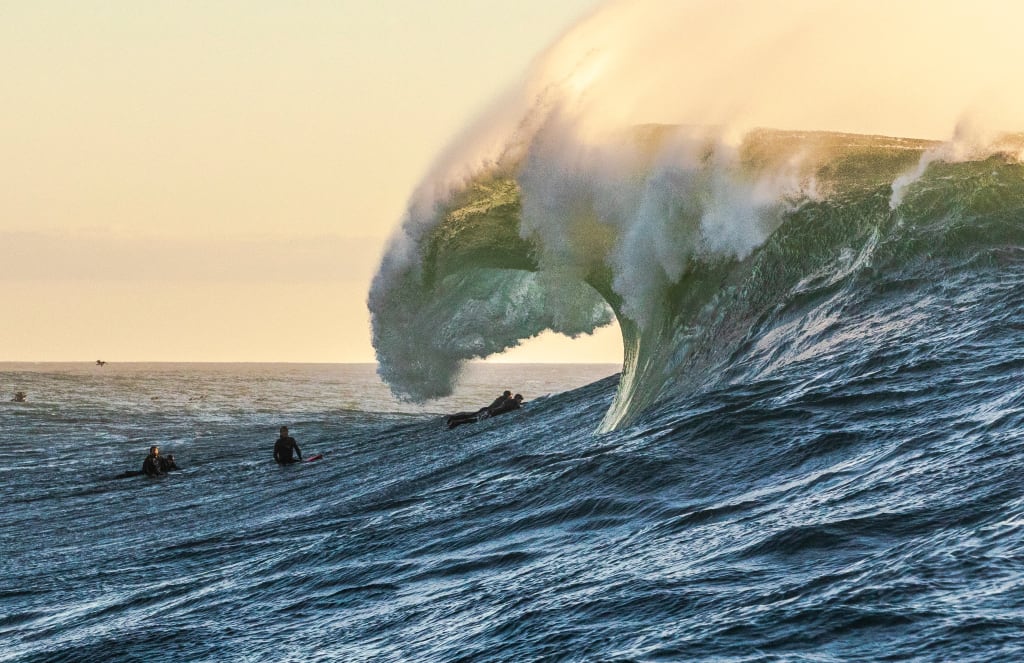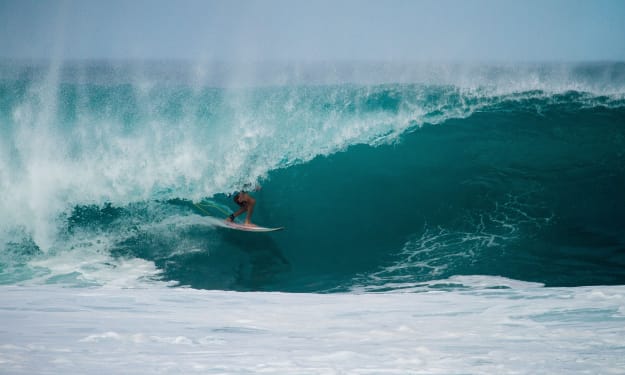Surfing Bipolar. Note #4
Wipeouts. Special edition in support of Ukraine.

No matter your experience level, you should avoid the impact zone of the wave. But sometimes, impact is unavoidable. Uncontrollable events happen. Wipeouts happen–in surfing and in life. Huge waves come and crash down on you; they push you under the water without giving you time to catch your breath. And the moment seems to last forever.
“...feeling helpless, trapped, and not knowing which way is up, is the ocean’s way of reminding us that we are but mere mortals. Being held down under the waves for much longer than you might like can be traumatizing, and can question your entire commitment to surfing.” - (Octavia Drughi)
In this series, I explore how surfing language and imagery can be used to describe the mood waves that come with the bipolar disorder experience. Being a non-native English speaker, I first learned the surfing definition of ‘wipeout’: being thrown off the board by a wave. Later, I learned the general meaning of the word. And once again, I found parallels between the two usages.
The act or an instance of wiping out:
- complete or utter destruction.
- a fall or crash caused usually by losing control
- a total or decisive defeat
In this note, we dive into what it’s like to experience surfing wipeouts and how this experience parallels the experience of unexpected traumatic events–small or disastrous like the war in Ukraine that this particular note is dedicated to.
I’ve never had a serious, big-wave surfing wipeout, but I’ve experienced plenty of serious, big-wave life wipeouts: divorce, immigration, depression, and a recent life-threatening accident. All of these wipeouts disrupted my life significantly and forced me to relearn, reimagine, and readjust.
As big as these personal wipeouts were, they seem small in comparison to the huge, heavy ‘bomb’ wave that’s been exploding in its own power. Ukraine has found itself in the impact zone of this wave since the brutal invasion conducted by Russian forces in February 2022.
The destructive energy of this wave reaches for miles and miles and travels all around the globe. First, the wave caused everyone in the country to wipe out. This has left the population with physical and mental wounds; some of these impacts have been fatal. The wave has also affected the lives of those at a distance–relatives, friends, colleagues, and anyone else who is witnessing and empathizing with the suffering in Ukraine.
...feeling helpless, trapped, and not knowing which way is light, is life's way of reminding us that we are but mere mortals. Being held down by the events for much longer than you might like can be traumatizing, and can question your entire commitment to living… (Rephrasing of quote by Octavia Drughi)
There are several types of wipeouts in the surfing world. Some wipeouts, like Axe Wipeouts, cause severe damage and can lead to intense pain and injuries. Others, like Pearl and Spins, are easier to recover from. The two most dangerous wipeouts have names that speak for themselves–‘Over the Falls’ and ‘Two Wave Hold Down’. The impact that both of these wipeouts have on your body and mind can be fatal.
I find that life's traumatic events and their effects on our brains and feelings of order vary in a similar way. Certain lived experiences are easy to recover from, like a Pearl. While others feel more like an Axe Wipeout, and are harder to mentally recover from. Let’s explore each of these wipeouts more closely. And later, we’ll discuss techniques used to get through wipeouts safely.
Two Wave Hold Down
- A Two Wave Hold Down happens when, after the fall from a surfboard, a surfer is held down underwater by the wave for two (or more) successive waves.
- I imagine that this is how civilians caught on the frontline of the impact zone might feel. The lives of whole families have been held ‘underwater’ for weeks* with their hometowns being swept by the death wave. Lives have been on pause or destroyed. People are hiding in bomb shelters, under bridges, in buildings–focusing only on survival, hoping for a breath of safety and freedom.
Over the Falls
- An Over the Falls happens when a surfer gets pulled by the wave to its peak, and then free falls down with the wave’s lip crushing into the ocean’s flat surface.
- The war has significantly disrupted the lives of people who have been swept into the whirlpool by the force of the events. People have been forced to leave everything behind, risking their lives to escape to a safer space after their hopes for a peaceful resolution were crushed by brutal reality. Millions have been displaced and become refugees, hoping to go home after the death waves pass.
Axe
- An Axe happens when a surfer is caught in the direct impact zone and gets hit by the lip–the most powerful part of the wave. On the human body, this might feel like an axe cutting through.
- The current war has a similar mental ‘axe’ effect on people who are close to those experiencing direct physical impact–people who have deep roots in and an emotional connection to Ukraine. The impact on their loved ones, on the memories and personal histories, causes them to experience psychological trauma even when physically far away from the war zone.
Pearl & Spin
- A Pearl happens when the nose of a surfboard goes under water, the surfer loses balance and falls. This is more likely to happen while gliding on the steep part of a wave. A Spin happens when a board slides out from a surfer who turned too hard on the steep part of a wave, or lost control on a bump in the water. Both are disorienting, but if handled properly, relatively easy to recover from.
- With the rise of social media and availability of news about the war from people we have an emotional connection with, more people’s lives are affected by the war wave, especially those who are strongly emphatic. The constant access to imagery affects their safe lives, changing their moods and ability to function. This phenomenon is known as secondary (or second-hand) trauma, and has been referred to as “the cost to caring”. Many start to experience compassion fatigue characterized by physical and mental exhaustion, as a result of the ongoing “demands of being empathic and helpful to those who are suffering.” [1]. This can have a direct effect on usual routines, future plans, and life perspective–all feels like falling off the board. This is disorienting, but if handled properly, the recovery process is manageable.

“The wipeout is a part of surfing, whether you like it or not.” -(Kahaluu Surf&See Blog)
Even though wiping out is the last thing anyone wants to experience when surfing, there is no way to avoid the experience forever. There are a number of safe and useful surf techniques to remember when approaching any size of wave. And while surfers have the luxury of choosing which waves to ride, life’s events often don’t give us the same choice
"Never expect to fail, but always plan for it.” -(James Clear)
Some of the surf techniques can be translated and used to cope with life wipeouts, because, like it or not, wipeout is also a part of life. Let’s look at three: don’t panic, come out cautiously, and recover.
- Don’t panic→Identify the panic
First thing that surfing blogs advise is no matter what happens, to stay calm. Panicking underwater will disorient you, and the added stress will push your body to consume more oxygen.
“The best thing you can do when you wipe out is not to panic.” -(Kahaluu Surf&See Blog)
In life, this can translate to the advice “do not panic, stay calm in stressful situations”. This is great advice I wish we could all follow. But like my therapist recently said, “Bullshit! It’s natural to panic.” In the very moment of crisis, stress, and danger, panicking is human nature. However, identifying the panic as soon as possible is extremely important for what needs to come next: finding a safe mental and physical space.
”The fight-flight-freeze response is your body’s natural reaction to danger. It’s a type of stress response that helps you react to perceived threats” - (Healthline)
When the war started, every affected individual’s brain went into stress picking between fight, flight, or freeze. While surfers spend time training their brains to respond in a certain way when under water, most of us don’t receive the same training before traumatic events like the bombing of our cities or those of our loved ones.
Our initial reactions to life’s wipeouts may look like fear, anger, sadness, shame, or a combination of these. The complexity of our feelings is highly influenced by our past and practiced behaviors, our individual mental ability, as well as our trauma and sociocultural history. [2]
Surfers learn how to switch from panic to action mode, and how to get to the surface safely and efficiently. As individuals going through life, we also need to learn how to choose the most appropriate and efficient response during wipeout events. Our responses should depend on what type of wipeout we are going through. The common ways to learn healthy responses include personal and group therapy, as well as reading resources on the subject.
2. Come out cautiously→Take control
In surfing, there are very specific actions one should remember and practice when falling off the board to safely make it out of a wipeout of any severity.

The surfboard is your friend when riding and your main danger when wiping out; so, your first priority is to protect your head when coming out of the water. Once you are safely out of the water, take control of your board, so that it doesn’t hit you or someone else.
In life, this translates to taking care of your safety before doing anything else. Your first priority should be to escape immediate danger. After your brain acknowledges the stressful event, make sure you have access to air, food, protection, or ways to escape to a safe place. For those who are affected indirectly–it is important to first acknowledge they are in a physically safe space, but it’s the secondary traumatic stress reaction that is directly affecting one’s ability to function.
The next step is to take control of your basics and routines. Coping, functioning, and maintaining wellness while being exposed to both first and second-hand trauma is possible. It is important to return one’s pillars of normalcy, where the very base layer is self-care:
- Basic hygiene
- Eating habits
- Sleeping routines
- Physical activities
The extra layer of developing personal resilience to the traumatic stress includes:
- reconnecting with your community
- remembering your personal relationships with genuinely caring and supportive people
And additional strategies for building resilience recommended by professionals are:
- detaching from media channels
- setting boundaries
- personal therapy / peer consultation
- practicing activities that bring one a sense of satisfaction of helping others who are more vulnerable
From my experience, people who live with bipolar disorder (like myself) have mental wipeouts more often. Therefore, I got to ‘practice’ the resilience techniques through life with bipolar mood waves and I place a high value on using those techniques to stay safe during any size of wipeout.
3. Recover→Accept the experience
Like we talked about before, different levels of wipeouts take different amounts of time to recover from. For light wipeouts, take a moment to recover, observe your surroundings, and decide if you would like to continue surfing. For stronger wipeouts where the effects are significant, the recovery process will take more time. Paddle away on your board to a safe spot, rest, and give your body and mind time to recover. And most importantly, analyze the fall and use what you’ve learned in your future surfing.
“If you had a really bad wipe out, get back on your board and paddle to an area where you can rest for a moment and catch your breath.”-(Kahaluu Surf&See Blog)
After wipeouts, getting into a safe space will mean a physical rest for the body, but the processing stage of a traumatic experience is a very active mental stage. This stage will form our views, perspective and future life. Unfortunately, while I finish this article, the war is still happening, and we cannot recover from something that is not yet finished. We are still experiencing the traumatic wipeout.
I hope we will all get to the recovery stage some time soon. Once we can begin active recovery, the process will take time. We will need to be gentle with ourselves, as well as be open to relying on community and outside support.
That is not to say that while we are still in this demon wave of war, we do not still each have roles to play. Those directly affected need to focus on surviving. Those who can help, help–support each other, while also taking care of your personal physical and mental health. And together we continue doing our best to create a better world together.
Like in surfing, the community–other surfers looking out for each other, ready to provide immediate help–is extremely important. Right now and always, watching out for one another should be not only surfing etiquette but human etiquette.
When someone is in trouble, we have the choice between complacency (to not acknowledge the situation and continue with our own lives) and adaptability (to figure out ways to participate and live through the experience). This choice will affect the future of the world community we live in.

Final words
Most people experience a traumatic event at some point in their lives, but humans are highly resilient and most trauma survivors develop (with time) appropriate coping strategies to process the aftermath of trauma. [3] And the better we learn to process one wipeout the more prepared we are likely to be for the next one.
“Remember that success is not final, nor failure is fatal. It is the courage to continue that counts.” - (Surf Today)
After great traumas it might seem that life has ended, that there is no more left of you to recover from. There is a fear of going back into the waters–the waves and the pain they may bring again. But after the shock has passed, your core values come back to the surface. Your core is still there. The will to live, the will to rebuild, is there–the memory of the feeling of freedom surfing the waves, experiencing life.
“Falling is the part and parcel of extreme sports. It signifies learning and enrichment of experience that will help you hone your skill.” - (Glossary of Surfing Wipeouts)
Recovery from trauma may feel like a push back. The journey might be slow, but life will continue. Our future will depend on what meaning we’ll make out of the past experience [4]. We will learn to mourn for others and for our past selves while continuing living, because of the values we stand for, because of the desire to live in freedom and happiness. Our core love of life is calling us back to surf on waves of life.
💚Thank you for reading,
Your fellow life surfer who is constantly falling, learning and trying again
_______________________________________________
LINKS:
- [1] Secondary Trauma: Definition, Causes, & How to Cope
- [2]Trauma-Informed Care in Behavioral Health Services
- [3]Understanding The Impact of Trauma
- [4]Post Traumatic Growth
CREDITS:
- Copyediting by Carmel Kundai
- Cover image by Todd Turner
- Surfing photos by Owen Lystrup and Jenna Anderson
NOTES
*the article was written in March 2022, the war in Ukraine was in progress for more than a month by the time the article was published.
*the author is writing from personal experience living with bipolar disorder and learning to surf. For any clinical information or if you/somebody you know is struggling with the weight of bipolar disorder, depression, or another aspect of their mental health, please reach out to a professional. Same applies to surfing--please search for professional channels to learn surfing.
About the Creator
Varvara
Hello
Reader insights
Nice work
Very well written. Keep up the good work!
Top insights
Easy to read and follow
Well-structured & engaging content
Eye opening
Niche topic & fresh perspectives
Heartfelt and relatable
The story invoked strong personal emotions
On-point and relevant
Writing reflected the title & theme
Expert insights and opinions
Arguments were carefully researched and presented
Compelling and original writing
Creative use of language & vocab
Masterful proofreading
Zero grammar & spelling mistakes
Excellent storytelling
Original narrative & well developed characters







Comments (4)
You are a blessing to coping and understanding what so many people go through now days. You share a vision to help people understand what they are going through and share clarity to help move along the wave 🌊 I enjoy it thanks for all that you do and write appreciate it ten fold
So relevant in so many ways at this time in a troubled world! Your flow of information and analyzing of trauma coping skills was right on target. The thought of surfing waves scares me beyond words, but it is no more scary than many of the threats and dangers we ALL face today. I hearted, commented, left insights, and subscribed.
Excellent writing adn it helped oen my eyes to a lot of things re bipolar. Big hugs , I don't know you but you have any support I can gove. You aslo have a subscriber too.
hello sweety follow me text me personly